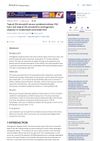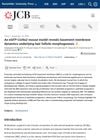Skin cells can naturally limit the growth of cancerous changes by balancing cell renewal and differentiation.
 7 citations,
July 2011 in “Survey of Ophthalmology”
7 citations,
July 2011 in “Survey of Ophthalmology” The document concludes that periocular hair disorders have various causes and treatments, and proper evaluation by specialists is important for management and prognosis.
 April 2024 in “International journal of women's health”
April 2024 in “International journal of women's health” Adult female acne is a complex condition that can worsen with menopause, requiring holistic treatment and tailored skincare at different life stages.
2 citations,
September 2021 in “Anais Brasileiros de Dermatologia” Increased sunscreen use may be linked to frontal fibrosing alopecia in Hispanic females.
 April 2024 in “The Journal of experimental medicine/The journal of experimental medicine”
April 2024 in “The Journal of experimental medicine/The journal of experimental medicine” Treg cells help repair and regenerate tissues by interacting with local cells.
 February 2024 in “BMC genomics”
February 2024 in “BMC genomics” The TRPV3 gene variant may cause the long-haired suri alpaca coat.
The balance between cell renewal and differentiation controls the growth of cancerous cells in mouse skin.
 September 2023 in “Frontiers in Medicine”
September 2023 in “Frontiers in Medicine” The scalp fat tissue of men with hair loss shows changes in gene activity that may contribute to their condition.
 9 citations,
May 2020 in “Journal of Pharmaceutical and Biomedical Analysis”
9 citations,
May 2020 in “Journal of Pharmaceutical and Biomedical Analysis” Method measures latanoprost and minoxidil in skin accurately and precisely.
 August 2023 in “International Journal of Molecular Sciences”
August 2023 in “International Journal of Molecular Sciences” Human skin xenografting could improve our understanding of skin development, renewal, and healing.
10 citations,
April 2020 in “PloS one” Lack of Crif1 in hair follicle stem cells slows down hair growth in mice.
 August 2023 in “Journal of Cosmetic Dermatology”
August 2023 in “Journal of Cosmetic Dermatology” Using a laser with minoxidil was more effective for hair loss than minoxidil alone.
 4 citations,
February 2022 in “Experimental Dermatology”
4 citations,
February 2022 in “Experimental Dermatology” Hair loss in men might be linked to changes in cell energy factories.
3 citations,
April 2022 in “Biomolecules” Higher miR-34a levels and the A variant of the MIR-34A gene are linked to increased risk and severity of alopecia areata.
1 citations,
August 2023 in “Biomolecules” Certain immune-related proteins are higher in people with alopecia and their healthy relatives, hinting at a genetic link.
 2 citations,
September 2021 in “Orphanet Journal of Rare Diseases”
2 citations,
September 2021 in “Orphanet Journal of Rare Diseases” People with hypohidrotic ectodermal dysplasia are more likely to experience long-term fatigue and hair loss after COVID-19.
 November 2024 in “The Journal of Cell Biology”
November 2024 in “The Journal of Cell Biology” Basement membrane changes are crucial for hair follicle development.
6 citations,
December 2022 in “Journal of Infection” The ACE1 gene variant doesn't affect long-COVID symptoms.
June 2024 in “Journal of Drug Delivery Science and Technology” Nanocarrier-based treatments show promise for better hair growth in androgenetic alopecia but need more research.
 December 2022 in “Animal Biotechnology”
December 2022 in “Animal Biotechnology” The Orenburg goat breed has unique genetics that require more detailed research and careful breeding.
 1 citations,
May 2023 in “Frontiers in endocrinology”
1 citations,
May 2023 in “Frontiers in endocrinology” A new MBTPS2 gene variant disrupts fat metabolism and collagen production, causing Osteogenesis imperfecta.
 2 citations,
March 2022 in “Applied sciences”
2 citations,
March 2022 in “Applied sciences” Lespedeza bicolor extract promotes hair growth and increases hair follicle cell growth, potentially making it a better treatment than minoxidil.
 July 2024 in “Periodontology 2000”
July 2024 in “Periodontology 2000” Autologous platelet concentrates show promise in esthetic treatments but need more standardized research.
 9 citations,
March 2021 in “Hormones”
9 citations,
March 2021 in “Hormones” COVID-19 may affect male fertility and women might have better outcomes due to hormonal and immune differences.
 12 citations,
January 2016 in “Journal of Assisted Reproduction and Genetics”
12 citations,
January 2016 in “Journal of Assisted Reproduction and Genetics” Certain gene variations are linked to higher male hormone levels in Chinese women with PCOS and insulin resistance.
 August 2024 in “Frontiers in Public Health”
August 2024 in “Frontiers in Public Health” Alopecia Areata severely impacts mental health, causing anxiety and depression, affecting quality of life.
 June 2022 in “Journal of Experimental Biology and Agricultural Sciences”
June 2022 in “Journal of Experimental Biology and Agricultural Sciences” Higher testosterone harms sperm motility, while higher estradiol improves sperm survival.
 April 2024 in “Canadian Journal of Ophthalmology”
April 2024 in “Canadian Journal of Ophthalmology” A woman with advanced eye cancer went into complete remission using a combination of immunotherapy and topical treatments.
 3 citations,
January 2023 in “PloS one”
3 citations,
January 2023 in “PloS one” Implanting hair-follicle stem cells in mice brains helped repair brain bleeding and reduced brain inflammation.
 September 2023 in “Medicina-lithuania”
September 2023 in “Medicina-lithuania” The study suggests that analyzing DNA can help treat hair loss, but more research is needed.





















